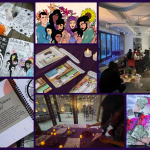Ayuda is deeply familiar with the struggles of low-income immigrants in the Washington, D.C. area. We have been at the forefront of providing multi-lingual social and legal services to immigrants for the past 34 years. Ayuda routinely helps immigrants reunite with their families, apply for citizenship or asylum and protect themselves and their children from domestic violence.
Several years ago, Ayuda began representing immigrants who had been illegally trafficked in the United States and forced to work under horrendous conditions for little or no pay. In 2003, Ayuda launched the Human Trafficking Project to serve this extremely vulnerable population. Five years and 100 cases later, our clients’ empowering stories continue to move us to action.
Human trafficking is a crime in the United States. An estimated 20,000 people are trafficked in the United States annually, according to the latest report by the U.S. Department of State. Trafficking victims come to the U.S. from their home countries in search of work, opportunity and a better future. Deceitful traffickers often prey on these dreams by promising safety and securing employment, while in reality they deliver victims into forced labor arrangements.
Ayuda serves a range of human trafficking cases each year. Recent clients include: a Latin American child forced to work as a prostitute by a man she believed to be her boyfriend, a South Asian woman forced to work as a domestic servant for a diplomat, and an African young woman forced to work in a beauty salon by a family member. As human trafficking activity increases worldwide, Ayuda has served clients from countries around the globe, including El Salvador, Bolivia, Brazil, Guatemala, Peru, Honduras, Thailand, Mexico, Ethiopia, India, Korea, and the Ukraine.
Victims of human trafficking face many difficulties in escaping from their slave-like conditions. Trafficked persons often don’t speak English, and are isolated from families, friends, and support networks. They are often completely dependent on their traffickers for food, shelter and clothing. Traffickers use coercion tactics that include physical restraint, beatings, rape, emotional and psychological abuse, and threats to family members to keep their victims in the trafficked situation.
The resulting trauma of human trafficking makes recovery difficult for survivors. Ayuda has found that it takes a great deal of time for clients to build trust with their attorney and social worker. It is important for survivors to know that reporting the crime will actually protect them from their trafficker and will not jeopardize their ability to remain legally in this country. Trust is also essential for clients to open up about their situation and give full details to our attorneys and law enforcement officials in the case against their trafficker.
Ayuda attorneys help victims navigate the complex legal system. Victims can gain legal relief through protection under the Trafficking Victims Protection Act of 2000. Relief under this law grants victims a T visa to allow them to legally live and work in the U.S. and eventually apply for legal permanent resident status. Ayuda attorneys maintain a remarkably high success rate for legal cases of human trafficking, a testament to the expertise of our legal staff.
In addition to legal representation, survivors of human trafficking also need help learning how to become self-sufficient. Survivors struggle with securing basic needs and services, such as a source of income, emergency housing, clothing, food and other immediate needs. They also work to recover from the emotional trauma of their abuse to build stability in their lives. Ayuda’s social workers also help clients enroll in job training programs, GED courses, and English classes and give referrals for affordable housing programs, daycare, medical care, and government programs.
Identifying the victims of human trafficking is a significant challenge of the Human Trafficking Project. Victims often do not seek assistance because they fear retaliation from their trafficker. Ayuda has seen many examples of traffickers threatening victims’ family members in their home countries, physically beating and emotionally abusing the victims, and using many other forms of control and intimidation. Ayuda’s social workers and community outreach staff work to educate immigrant communities about the law regarding human trafficking and encourage victims to speak out and seek help.
Recently, Ayuda launched a community outreach campaign with a grant from the D.C. Metropolitan Police. We are targeting the African and Latino immigrant communities with brochures in Spanish, French and Amharic. Ayuda will reach thousands of D.C. area residents through the dissemination of outreach material, radio commercials, bus ads, community presentations, and articles in ethnic newspapers.
Although we have served more than 100 clients since the Project started, much more needs to be done to reach local victims with information about human trafficking and direct assistance. More and more victims are trafficked to the D.C. area, one of the nation’s hotspots for this type of criminal activity. Ayuda needs the continued support from our partners to collaboratively address this tragic problem in our community.
September is Human Trafficking Awareness Month, and Ayuda is working with Washington Area Women’s Foundation to bring awareness to this issue.
If you are interested in learning more about human trafficking in the D.C. region and how Ayuda is responding to this crisis, call Estera Barbarasa at 202-243-7306.
Or, learn more about how you can join The Women’s Foundation in its support of local nonprofits and their work on issues, like human trafficking, that impact women and girls in our region every day. Join us, and get involved with The Power of Giving Together, where we work together to bring change home.
(Also, join us for our Leadership Luncheon on October 10. Come get inspired and connected to the work we’re doing, and see the change we’re making firsthand.)
Ayuda is a Grantee Partner of The Women’s Foundation. This blog was prepared by Estera Barbarasa, Ayuda’s fundraising and public affairs coordinator, in collaboration with Drake Hagner, Ayuda’s development and communications associate.



